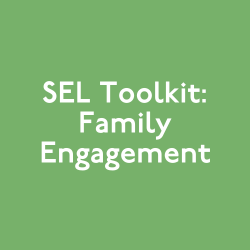What is social emotional learning (SEL) from the perspective of a parent? Findings from a recent study show that education jargon doesn’t translate well for parents; they prefer the term “life skills,” because it is an easily understood term that is all-encompassing and, perhaps, more digestible for some.
Parents already have some knowledge of SEL; they want their child to have a well rounded education. In fact, 78% of students believe these life skills are equally as important as academic development. This research also suggests that many parents do in fact claim ownership over their child’s social emotional development, though they expect for this development to be supported through their child’s formal education. Parents may feel uncomfortable with certain terminology and hesitant to have their students participate in SEL programs and curriculum based on factors such as cultural influence, individual parenting style and a lack of understanding.
So how can school leaders and educators effectively talk to parents about social emotional development?
Introduce The Important Terms
What parents and educators can agree on is the importance of the skills students gain from SEL: social awareness, relationship skills, responsible decision making, self-management, and self-awareness. Introduce them to the important terms and how they apply to social and emotional development – terms like resiliency, empathy, self-regulation, gratitude, active listening, and growth mindset.
Provide them with real-world examples of SEL in your school or district. What is your school doing to showcase it’s SEL initiatives? How can you provide examples to families so they can see the benefits? Can these examples be resources to send home with students? How can you relay this information?
Find Out What They Know
Identify how parents feel about SEL. SEL can be a vulnerable process and the parents you collaborate with may have strong feelings on the subject, especially where their child is involved. Maintain open communication – address any possible concerns and uncover all misconceptions so that you are able to form a deeper connection with parents. This will help ensure the best possible outcome for your student’s social emotional development.
It is also critical to find out what families are already doing at home to support the social and emotional wellbeing of their children. Conversations during meals, traveling, playing games together, going grocery shopping together, watching television programs – these activities have a huge impact on children’s social emotional development. By identifying what parents are already doing at home, it’s easier to provide resources that will be helpful to them and their children.
Develop an easily accessible survey, plan out a PTA meeting, schedule phone calls – find easy and effective ways to have these important conversations.
Meet Them Where They Are
Understand the families you’re communicating with. Many factors can influence our understanding of what SEL is, and how it applies to our lives. Take into consideration the various cultural influences and life experience of your students and their families – these factors are likely to have a critical impact on these conversations. SEL requires us to confront our own biases.
After reflecting on the factors that will influence these conversations with parents surrounding social emotional development, how will this affect your approach in communication? It is necessary for school communities to address this topic before dealing with families. Understanding the families you’re communicating with will affect the implementation of SEL programming and curricula.
Be Ready for the Difficult Conversations
When talking to families about social emotional development, most parents will want to know their child’s individual progress and areas where improvement is needed. If a concern surrounding a student arises, are you prepared to discuss these sensitive subjects with parents? Expressing concerns empathetically and coming up with strategies to work on collectively will help support your student’s development.
Try to ground concerns in data – what should you be witnessing within your child’s development from a human development perspective? Provide examples about what you’re witnessing in the classroom so parents get a clear understanding of concerns.
Involve The Students
Parents understand and know their children the best. Show families the progress their students are making in their social emotional development. Are there any special projects students are working on that can be taken home and shared with their families? Are there any take-home activities that students can do with their parents? Is there something that can be showcased on your school or district website?
A good example of this could be sharing stories directly from the classroom. In the same way that we would notify parents on a child’s negative behavior, it is equally important for parents to be notified on the positive behaviors and milestones reached in their social emotional development.
Students should also feel empowered to share the concepts they’re learning at school with their parents and loved ones. Encourage students to discuss their mental and emotional health at home; encourage them to share the various emotional management strategies, expression techniques, and extended vocabulary they’re acquiring in the classroom.
Support Ongoing Parent Involvement
How can we support ongoing communication between families and school staff? It is important to think about what flexible support you can offer families. Is there anywhere on your website that you can store these resources you have acquired on SEL? What role can parents play during SEL instruction time in the classroom? Can you create support groups that meet at the school? Can you create a Facebook group for parents to discuss these topics; if not, are there any you can point them to? Is there anyone on staff that is equipped to have these important discussions with families? Finding ef
fective ways to allow parents to play active roles in the classroom and the community has a large impact on student success.
Involving parents in social emotional learning helps students learn from example, and it forms deeper connections within the community. Equipping staff, educators and district leaders with the knowledge and the tools to effectively communicate with parents about their child’s social emotional development is a necessary measure that will help to support the success of SEL initiatives.
Sign up for Move This World’s newsletter to stay up to date on social emotional learning.
Enter your email below










